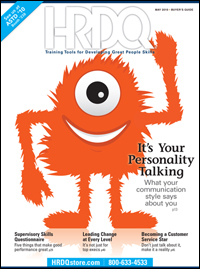|
What’s My Communication Style?
Uncover preferred styles of verbal and nonverbal communication with the fast and fun What’s My Communication Style? Using a 24-item inventory, participants will learn their preference for one of 4 communication styles, recognize the various facets of communication, and learn how to use their own style to enhance communication.
How personality drives communication Communication is the very lifeblood of any organization. And effective communication skills are the building blocks for what is commonly referred to as “people skills.” If managers cannot communicate clearly and persuasively with employees, and employees with customers, then other vital goals are forever out of reach. Say goodbye to aspirations for capable leadership, teamwork, customer service, or even the ability to execute a coherent business strategy. If you want to bring about meaningful improvements in communication skills, the best way to begin is to build a better understanding of personal communication styles and their effects on others. What’s My Communication Style is a proven training assessment that identifies an individual’s preferred style—Direct, Spirited, Considerate, or Systematic—and the communication behaviors that distinguish it. Part of the best-selling HRDQ Style Series, the assessment and its supporting materials provide a practical and easy-to-use “language” that enables lasting insights into how to gain mastery over one’s own communication behavior and how to interpret the behavior of others—in any situation. What’s My Communication Style is a powerful centerpiece for management development and interpersonal skills training.
Learning Outcomes The power behind What’s My Communication Style and the HRDQ Style Series products lies in the simple but effective model for understanding communication behavior. Based on the proven personality theories of Marston and Jung, the model identifies two basic dimensions of personal style: Assertiveness and Expressiveness. Assertiveness is the effort a person makes to influence or control the thoughts or actions of others. Expressiveness is the effort that a person makes to control his or her emotions and feelings when relating to others. Combining the two dimensions results in a four-quadrant model with four unique personal styles: Direct, Spirited, Considerate, and Systematic. The simplicity of the HRDQ Style Model is easy for trainers to facilitate and memorable for employees and managers to apply.Click here to visit HRDQ Uses for the Assessment What’s My Communication Style is appropriate for anyone to use for both personal and management development. The assessment can be used as a standalone training assessment, or it can be incorporated into a more comprehensive training program on communication skills. It makes an effective foundation component for a variety of soft skills training topics, including communication, leadership, team building, and supervisory skills.
What’s My Communication Style starts with a self assessment that takes approximately 10 minutes to complete. Individuals respond to 24 different items relating to both verbal and nonverbal communication by selecting the statement ending that they believe best reflects their perceived communication behavior. Scoring the responses provides individuals with a total score for each of the four personal communication styles: Direct, Spirited, Considerate, and Systematic. The majority of individuals will show a clear preference for one of styles, which is their Dominant Style. If you are planning to use the assessment for classroom training, we recommend you allow approximately 1 hour for interpretation of scores, topic discussion, debrief, and action planning. The What’s My Communication Style Facilitator Guide includes everything you need to lead a successful training session from comprehensive background information and activities, to reproducible handouts and even a professional PowerPoint presentation. The Facilitator Guide also offers an easy-to-follow workshop outline that expands What’s My Communication Style into a 1.5-hour program. Go to HRDQ to use this assessment:
The Dynamics of Rapport: Using Neurolinguistics to Improve Communication Duration: 60 minutes
Overview Now turn it around. A friend introduces you to someone they just know you’ll love. Or you meet someone that you expect to like immediately. Yet you’re surprised when you dislike them right off the bat – or you’re indifferent to that person, at best.
A well-respected author and consultant, Jim Eicher is a subject matter expert in the fields of sales, organizational strategy, leadership, and communication. During his career, he has held leadership roles at Booz Allen Hamilton, Andersen Worldwide, Symantec, and NetApp. He was also the founder of Cognitive Management, a training and consulting with worldwide clients such as Xerox, Reuters, Sony, Simon and Schuster, Amdahl, and Nortel.

Custom Search

Custom Search
|










